






















Ours is a period of unending crisis. There existed a time where wealth and status hindered the well-off from perceiving it; yet the political, economic, and socio-cultural turmoil of today is not something that can be meekly shrugged off, even by the privileged. Whether on a national scale or within the university, crises demand to be felt and reckoned with.
Case in point: the attempt of state forces in Baguio to militarize campuses and terrorize students. Four from UP Baguio (UPB) were surveilled by police and military elements in the past months, all of which are members of progressive organizations. Despite the promise of safety and security within UPB, critical students remain as vulnerable as anyone else once they step foot outside the campus.
The UP administration itself has been, at one point or another, the cause of the crisis. The abrupt shift of the class

accommodations so close to the start of the second semester. Still, the administration refused to move the sem back to its original start date.
Around this time, nearly 60 dormers were also expelled from the university’s dorm UP Baguio Residence Hall (BREHA). With less than two weeks before classes and a soaring 8.6% inflation rate to match, the students were left to their own devices to find affordable housing.
Outside UPB, Ferdinand Marcos Jr. seems hell-bent on continuing the state fascism of
in broad daylight on January 10. The couple reported that their abductors identified themselves as policemen and that they spent days handcuffed and blindfolded. In the Cordillera, seven Northern Luzon activists were given false terrorism charges. One of the Northern Luzon 7, Jennifer Awingan, was arrested and detained in Baguio City Police Office and later in Abra Provincial Jail before being granted bail along with the other six. Of the seven charged, two were UPB alumni, and
These events–from those as local as the BREHA eviction to those as widespread as the militaristic attacks against progressives–indicate that pressing social issues do not exist in their respective vacuums. A crisis in one segment of society will inevitably affect all others–and the education sector is no exception.

This manifests in how an astronomical inflation rate results in higher tuition fees; how increasing state fascism breeds campus militarization; and how a commercialized education system prioritizes profit over student welfare.
Contrary to the popular notion that students should simply focus on their studies and their careers, the material conditions of the present demand that they be anything but apathetic; for the very purpose of education should be liberation. It makes no sense to keep our noses buried in textbooks while the world burns.
When learning is not confined to mere intellectual exercise but used to analyze
struggles of those shouting for reform in the streets and striking behind picket lines.
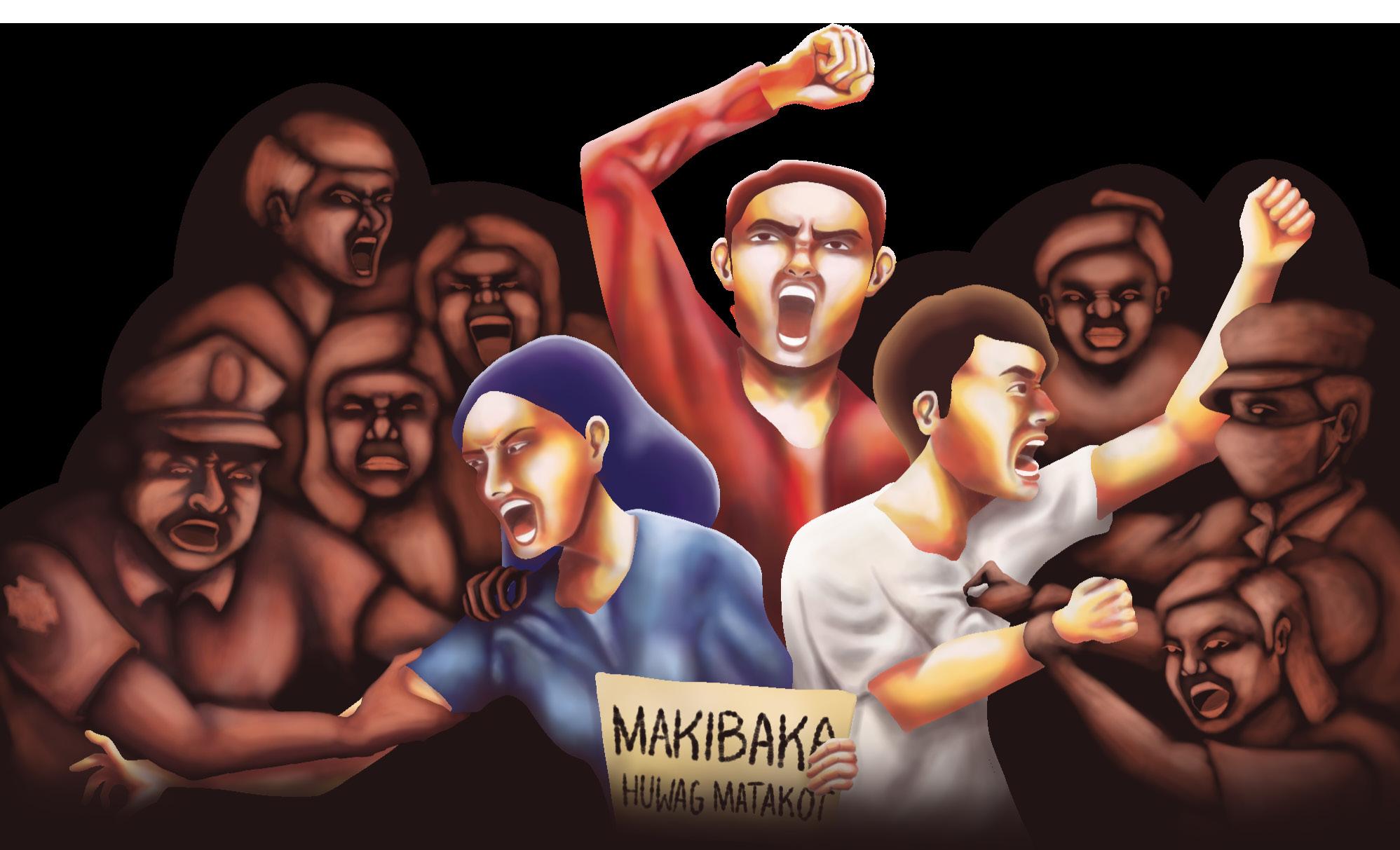
This is the very reason UP breeds revolutionary thinkers–those who have managed to bridge the disconnect between highbrow education and the plight of the toiling citizenry: Jennifer Cariño, Chad Booc, James Balao, Maria Finela Mejia and many others whose critical and unwavering resolve are embodied today by likeminded student-progressives. No longer should students confine themselves to armchair academics, since we ourselves are not spared from the unmitigated impact of soaring inflation, jeepney phaseout, state-sponsored attacks, disinformation, and a multitude of other issues that only aim to empower those atop the social triangle and leave the rest to fend for themselves.
The political situation we find ourselves in is too severe, too enraging to warrant anything less than the sharpest and most militant response–one that necessitates breaking out of our classrooms and taking to the streets.
For in times of crisis, the place of the student is the same as everyone else’s: within the ranks of the broader masses. ▼


This is what Deign Soriano, a junior faculty member in the University of the Philippines Baguio said during a series of interviews with Outcrop, where faculty members and former student assistants (SA) recalled their experiences of wage setbacks while working in the university.
Regularized Delays

Having experienced delayed pay of three weeks to about a month as an SA, Mario Cepada*, a Communication student, joined Soriano in calling for equity and workers’ rights for all university staff.
“All or most of the time sa naging experience ko, every month ay delayed ang sahod,” Cepada said. “Nung December, nagpasa kami early– way before the deadline. Usually daw yung processing [ay] after nung 7th day [ng month]. Parang every week chinecheck namin around 7, around 14, around 22, wala talaga.”
While certain salary requirements are to be met by the workers, both stated how some delays are not justified.
“But there’s also cases where everything’s submitted but still, bakit siya tumatagal–which is obviously not ethical because you deserve to get paid for the services you rendered,” Soriano said.
He and Cepada also emphasized the hardship caused by salary delays in a country under a state of economic struggle.
“Di na sumasapat ‘yong binibigay ng pamilya ko and ‘yong nakukuha ko as SA dahil 18 units ako and delayed pa ‘yong sahod. So, maliit na nga ‘yong sweldo, delayed pa,” Cepada said.
“I think dito rin papasok ‘yong how resiliency is being glorified na parang kaya naman nating mamaluktot, magtipid, magsakripisyo nang konti… pero until what extent ‘yong kaya mong ipamaluktot o hindi ikain hanggang makuha mo sahod mo?” Soriano added.
As someone who has worked a blue-collar job abroad, Soriano could not help but second guess his return
to the university, given the comparably meager salary, aside from its ‘regular’ delays.
“What if maging attendant na lang ako? Marangal naman ‘tong trabaho and I’m earning twice [as much]. Masisisi mo ba ‘yong tao to look for opportunities outside this messed up country?” Soriano added.


During his part-time work at a grocery store in the United Kingdom, his pay, which was twice his salary in the university, was never delayed.
A systemic problem
The volume of requirements and the lack of proper coordination with workers are why Soriano and Cepada see bureaucracy as a reason for their struggles.
Cepada said the Office of Scholarship and Financial Assistance (OSFA) has a system where an SA should pass requirements by the seventh day of the month and get their salary one to two weeks after.

“Pero paperwork din kasi ‘yon so mahirap asikasuhin agad along with deadlines sa acads,” he reasoned.



Cepada also detailed how the fixed salary intended for SAs, regardless of the nature of their work, hinders flexibility among offices.
“Sana mas bigyan ng prerogative ‘yong mga offices kung paano pwedeng swelduhan ang mga SA kasi magkakaiba sila ng trabaho,” he emphasized.
Apart from needing an alliance where student assistants can collate and forward their concerns, Cepada likewise highlighted the need to communicate salary delays better.
“Siguro ‘yon ‘yong bare minimum na pwede nilang gawin… na sabihin kung kailan makukuha ‘yong sahod. Pero syempre maganda na mabigay nila sa tamang oras ‘yong sahod namin,” he added.
Based on Outcrop’s interviews with several professors and SAs, an ongoing pattern of weeks to monthlong delays can be observed. Understaffing, a problem

nahihirapan tayong kumuha ng mas maraming faculty members [para mapunan ‘yong mga problema].”
He also mentioned the lack of 'items' or tenurable positions for teachers as another problem, saying that this leads to more contractual workers.
“Going back, it [contractualization] is a systemic issue. Because kada buwag mo ng isang barrier [i.e. bureaucracy], mayroon na naman. The priorities of the entire government are misaligned,” Soriano adds.
to be addressed.
On-time pay, benefits, and opportunities are what constituents need according to Soriano.
“Hindi natin kailangang makipagsabayan sa rankings. ‘Yong pagpuno lang ng mga basic rights ng mga manggagawa, faculty, enough na ‘yun,” he emphasized.
Soriano also stressed the importance of unions in forwarding the calls of constituents.
that Soriano said stems from bureaucracy as well, is another challenge, one that affects even the students.
“Kaakibat dito ‘yong… kulang ng sections, kulang ng subjects na hindi na rin naman [na] kasalanan ng departamento o kolehiyo, kundi systemic na siya,” Soriano added, “sa sobrang bureaucratic ng process,
Reduced budgets in state universities and colleges results in an increased number of contractual workers and fewer slots for tenure. This year, the Commission on Higher Education (CHED) suffered an estimated 2 billion budget cut.
Claiming their due
To date, the issues faced by Cepada and Soriano are yet
“’Yong pagiging progresibo… militante, mas napu-push forward ‘yong human rights at mga karapatan hindi lamang ng faculty kundi ng bawat manggagawa sa loob ng unibersidad,” he stated.
In UPB, the All U.P. Academic Employees Union (AUPAEU) and the Rise for Education-UPB go hand-inhand in actively forwarding workers and students’ concerns respectively. ▼
*not his real name
JANUARY 18, 2023
The UPB Office of Vice Chancellor for Academic Affairs (OVCAA), along with other VCs from respective units sent a request for the UP President’s approval to move the first day of Second Semester classes earlier from February 13 to February 6.
JANUARY 25, 2023
Five days later, Vice Chancellor Rosemary Gutierrez responded to USC’s appeal, saying that the decision aims to follow the regular 16-week semestral schedule.
FEBRUARY 2, 2023
UP Baguio released guidelines on the conduct of face-to-face classes and activities for the Second Semester. At the same time, certain students received emails regarding academic delinquencies of which they were not notified beforehand.
FEBRUARY 6, 2023
The start of the Second Semester, AY 2022-2023. The UPB administration requested the faculty to conduct the classes in the first week asynchronously.
FEBRUARY 10, 2023
The UPB admin denied the request of the USC to further extend the enrollment period. According to the statistics released by the Office of the Chancellor, 90.17% of the student body was already enrolled, while 2.42% of students had been discharged. Also, 26% of Permanently Disqualified students have been admitted.
JANUARY 20, 2023
The University Student Council (USC) wrote a letter to the OVCAA requesting to reconsider the moving of Second Semester.
JANUARY 26, 2023
In between enrollment problems and post-semestral recovery, at least 58 students got an email from the UP Baguio Residence Hall (BREHA) management informing them that they were ineligible to reoccupy the dormitory and they had only until February 4 to retrieve their belongings.
FEBRUARY 3, 2023
As a result of the petition filed by USC and the low number of students who have enrolled, the enrollment period was extended until February 8.
FEBRUARY 8, 2023
An extension of the enrollment period was once again requested by the USC. This is in response to the number of reports of students who are still unable to enroll due to problems in accessing SAIS as well as reports from faculty members reporting difficulties in balancing tagging, grading, and advising responsibilities given that the First Semester has just ended.
For an institution that promotes honor and excellence, foremost honor, malaking sampal sa UP bilang national university na hindi mabigay ‘yong sahod nang nasa oras.”
IVY REYESKESSHA CARREON
Frominstitutionalizing red-tagging forums via the Cordillera Youth for Peace Convergence (CYPC) to the looming return of the mandatory Reserve Officers Training Corps (ROTC) through the House Bill (HB) No. 6687 or the National Citizens Service Training Program (NCSTP) Bill, the attempt to vilify youth activism has become stronger than ever.
Despite the continuing resistance of the youth against campus militarization, programs and bills such as the CYPC and the NCSTP Bill remain the government’s top priorities.
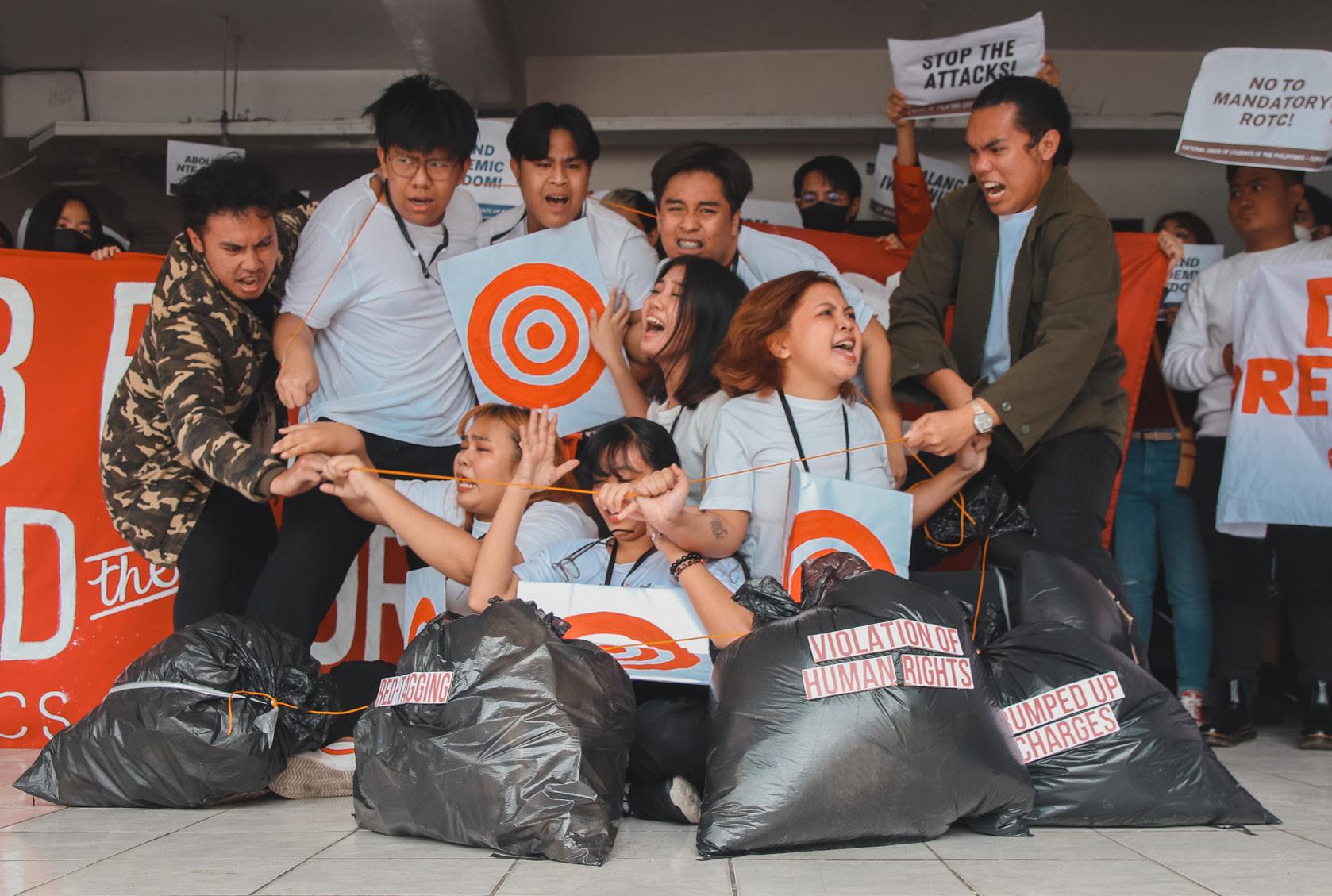
Hosted by the Regional Task Force to End Local Communist Armed Conflict (RTF-ELCAC) along with the National Intelligence Coordinating Agency (NICA), CYPC aims to “identify and educate students on the threat of student organizations as deceptive fronts in the recruitment of communist
terrorist groups (CTG)”. This is conducted among secondary and tertiary institutions upon the endorsement of the Commission on Higher Education (CHED)-CAR.


As attendees explain it, the forum claims to expose alleged CTGs's youth recruitment without concrete basis.
"Sa forum, pinapalabas nilang terorista ang mga lehitimong organisasyon na nagsusulong lang naman ng batayang karapatan ng mga Pilipino," James Aquino, a high school student, said.
Additionally, the RTFELCAC presents videos and statements from activists


which are taken out of context and used to link both said activists and numerous progressive organizations with the communist movement.
To support such claims, they present testimonies from “NPA surrenderees” whose credibility, according to students, is beyond questionable.
Far from its supposed goal to promote peace and security, CYPC incites fear to those who have been introduced to legitimate youth organizations like Anakbayan, the League of Filipino Students, Student Christian Movement of the Philippines, and student
formations such as the College Editors Guild of the Philippines and the National Union of Students of the Philippines (NUSP).
CYPC first began upon the release of DepEd-CAR Regional Memorandum 391, s. 2021 and was conducted by the RTFELCAC and NICA in partnership with Philippine Information Agency-CAR and CHED-CAR.
Its first implementation in September 2021 was through a webinar for universities in the region; but most of the participants expressed dissent during the forum and instead raised virtual banners with calls to stop red-tagging. An anonymous participant even annotated the phrase “defund [NTF-]ELCAC” on the screen.

"Instead of conducting state-funded red-tagging forums, our government institutions should instead focus on the calls of the students and the people," the UP Baguio University Student Council said, referring to CHED-CAR’s endorsement of the said forum.
Despite public condemnation, the conduct of CYPC has continued.
From November 2022 until March, more than five red-tagging forums have been launched, some even in secondary schools in the region, the latest being in Baguio City National High School on March 1.
Meanwhile,NUSP Cordillera submitted formal letters to the regional offices of the Commission on Human Rights and CHED on November 17 and February 22 to oppose the conduct of CYPC.
“National resources for these fora and political vilification could have been allocated to education, health, and our country’s industries which all need prioritization,” NUSP said in one of its letters.
The CYPC is not the first red-tagging program in the Cordillera. In 2019, the “Sulat Kamay” campaign which follows the same structure as CYCP was also conducted in schools across the region.
After its fast and smooth passage in the House of
Representatives, the NCSTP Bill has recently been discussed in the Senate sub-committee on Higher Education, Technical and Vocational Education.
In a hearing held last February 6, members of the senate proposed the return of mandatory ROTC, a different version than what was discussed in the House.
What was passed in Congress only seeks to institutionalize the four-year optional ROTC program with a curriculum to be designed by the Department of National Defense (DND) and CHED. Meanwhile, the Senate has already proposed a total of six bills planning to make ROTC mandatory for all college students.
As presented by DND in a Senate hearing last February 8, the projected budget for the implementation of mandatory ROTC is around P61.2 billion.

In response to the proposed bills, youth groups said that instead of pushing for the return of mandatory ROTC, what the government should do is strengthen NSTP so students could choose the NSTP component that best fits their interests.
Moreover, after requests to include youth groups in the Senate hearing, Akbayan Youth Chairperson Justine Balane was invited to read their group’s statement against mandatory military training.
“Sa panukala na gawing mandatory ang ROTC, naniniwala po kami na nawawala ang kalayaan ng ating mga kabataan na pumili ng programa na nararapat sa talento nila,” Balane said.
Through Republic Act No. 9163, or the NSTP Act of 2001, the mandatory ROTC program was made optional after the murder of Mark Welson Chua, a student from the University of Sto. Tomas in 2002.
Chua’s case is just one of the numerous ROTC-related deaths in the Philippines.
The NCSTP bill passed its third and final reading in the House of Representatives last December 15. In the plenary session on the same day, the bill was declared urgent by President Ferdinand Marcos Jr. ▼
Hindi tutugon sa krisis ng edukasyon at wika ang pagsuspinde ng mother tongue-based multilingual education o MTB-MLE."
Ito ang paglilinaw ng mga propesor ng wika sa Unibersidad ng Pilipinas Baguio (UPB) kasunod ng pagsuspinde ng MTB-MLE bilang daluyan ng pagkatuto mula kindergarten hanggang grade 3, alinsunod sa nilalaman ng House Bill No. 6717 na ipinasa ng House of Representatives noong Pebrero 6.
Inilabas ang panukala upang bigyan umano ng panahon ang Department of Education (DepEd) na umugnay sa Komisyon ng Wikang Filipino (KWF) para kumatha ng mga libro at ayusin ang iba pang materyales na kinakailangan sa "epektibong" pagpapatupad ng MTB-MLE.
Ngunit habang ito ay isasagawa, patitigilin din umano ang paggamit ng pangunahing wika sa partikular na lugar, o ang mother tongue sa maraming paaralan sa bansa–isang hakbang na tinututulan ng mga guro ng wika sa UPB dahil sa magiging epekto nito sa pagtuturo.
“Hindi kailangang suspindihin ang programa.
Mahalagang ma-evaluate ang programa pero hindi dapat ihinto ang pagkatuto ng mga mag-aaral sa kanilang sariling wika o mother tongue,” ani Rai Salvador, guro mula sa Department of Language, Literature and the Arts (DLLA) sa UPB.
Ayon pa sa kanya, mahalagang programa ang MTB-MLE dahil napapaunlad nito ang mga katutubong wika, bagamat hindi naipapatupad nang maayos ang mga layunin nito dulot ng kakulangan sa suporta ng gobyerno.
Para naman kay Tristan Buenaflor, isa ring guro mula sa DLLA, bukod sa hindi tutugon ang panukala sa krisis ng edukasyon at wika ay hindi rin makakatulong ang pagpilit sa Ingles bilang wikang panturo, bagay na isa pang nais isulong ng mga mambabatas at maging ni Marcos Jr.
Dagdag niya, ang mga polisiyang isinasantabi ang mga wikang katutubo tulad ng "English-only policy" at ang Commission on Higher Education (CHED) Memorandum no. 20, s.
2013 o ang pagpapatupad ng General Education
Curriculum, na siyang nag-alis ng asignaturang Filipino sa kolehiyo, ay ilan sa mga salik kung bakit napipigilan ang pagpapayabong ng wikang pambansa at katutubo.
“Tanggalin ang CHED Memo 20, ang mga Englishonly policy [at bagkus] ay palaganapin pa [ng gobyerno] lalo ang paggamit ng Filipino at mga pangunahing wika bilang opisyal na wika, sa mga legal na talastasan, mga dokumentasyong opisyal, at sa pagbabalita,” mungkahi ni Buenaflor.
Diin pa niya, “marami nang datos at pag-aaral ang nagawa na nagsasabing mas madaling matutunan ng mga estudyante ang Ingles at mga konsepto kapag tinutulungan muna silang maging bihasa sa unang wika nila.”
Unang inilunsad ang MTB-MLE nang maipasa ang DepEd Order No. 16 noong 2012 bilang parte ng K-to-12 Basic Education Program, ngunit isang dekada pa lang ay balak na itong suspindihin at palitan


Access more stories that aim to champion the interests of the student body and amplify the voices of the marginalized in Outcrop's newly established website: upboutcrop.org






Mapagpalayang kaisipan sa malayang pahayagan!
A MOTHER'S GRIEF. Overcome with emotion, Elvie Bolinget, wife of Cordillera People's Alliance Chairperson Windel Bolinget, affirms her support for her husband despite the harrassment their family has received due to his activism, February 8.
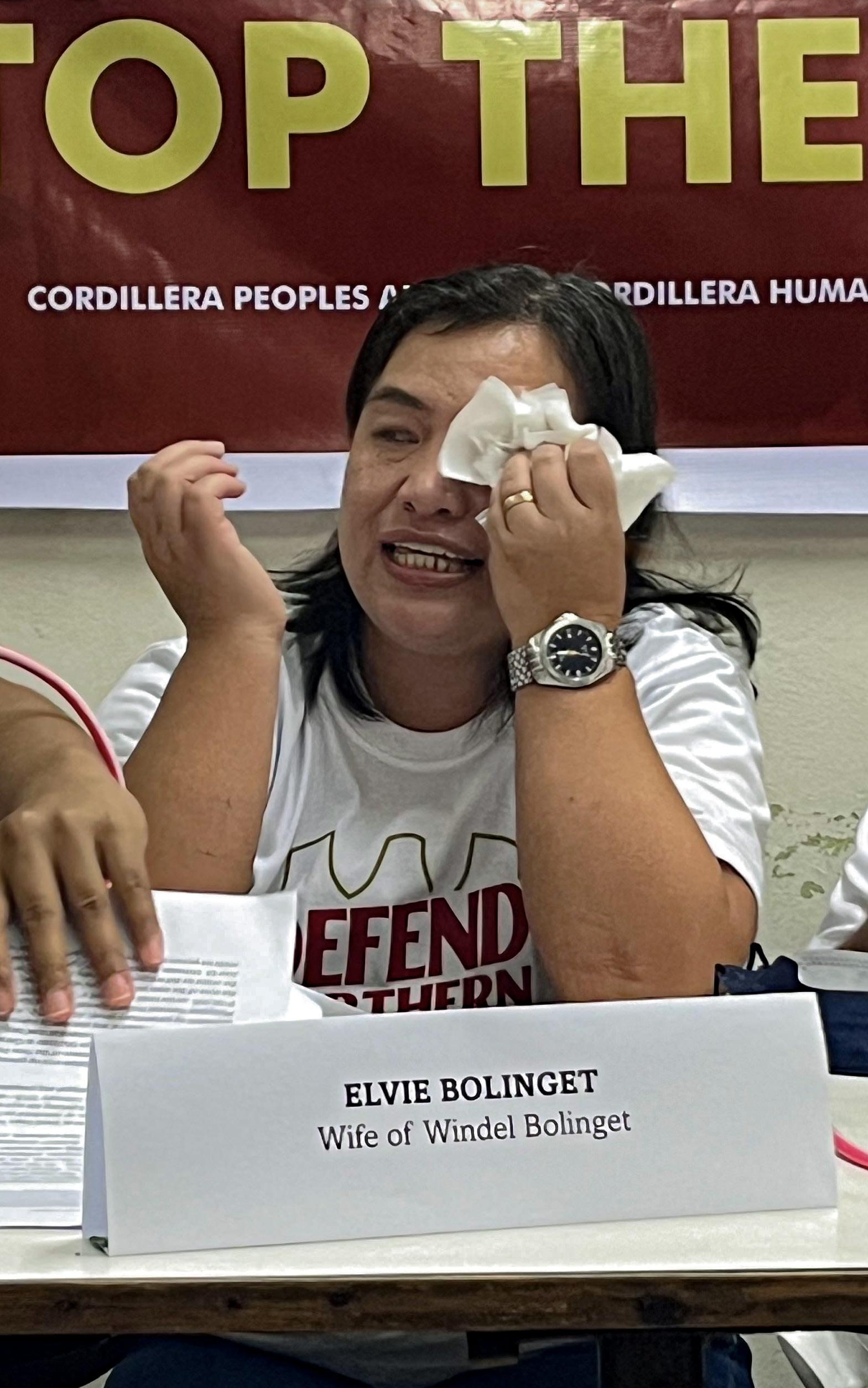
ng mga polisiyang makabanyaga.
Sa 11 na taong pagpapatupad nito, tila hindi pa rin natugunan ang mga isyu ng kakulangan ng materyales at kaisahan ng pamamaraan, replektibo sa karanasan ni Prof. Ana Isabel Caguicla na mula rin sa DLLA.
Aniya, sa isang pag-aaral na isinagawa nila sa lungsod ng Baguio, ang itinalagang wika ng pagkatuto sa mga paaralan ay Ilokano, ngunit isa lamang umano ito sa mother tongue ng mga estudyante mula sa iba’t ibang indigenous peoples groups na nakatira sa lungsod. Dagdag niya, kulang ang suporta ng gobyerno sa programa upang makamit ang layunin nito dahil sa halip na isama ang mga katutubong wika na kadalasan ay ang
tanging wikang sinasalita ng maraming mag-aaral, mga pangunahing wika lamang ang may materyales mula sa DepEd at naiiwan ang trabaho sa mga guro na ilapat ang mga ito sa mga katutubong wika.
Kaugnay nito, nagpahayag din ang grupong Tanggol Wika ng pagtutol sa panukalang batas, dahil anila’y taliwas ito sa interes ng mga estudyante at mga lokal na komunidad.
“Congress should also democratize the process of reviewing the education system through a bottom-up approach where inputs from all stakeholders will be valued and considered rather than set aside in favor of bureaucratic top-down schemes,” pagdiriin ng grupo hinggil sa kahalagahan ng masusing pagsusuri sa kurikulum. ▼

men go to their homes, speak to their parents, and proceed to go over details regarding their children’s affiliations, drumming up baseless accusations and discussing how they could be associated with alleged terrorist activities.

This is only a glimpse of the level of personal intrusion that elements of the state resort to. In UP Baguio, four cases of student surveillance have been recorded in the past months, proving that even if the campus is safe, state forces will always find a way to hound and terrorize studentprogressives.
Unwelcome guests
Back in 2021, the
Two progressive students from the four surveillance cases, Kessha Carreon and Angelika Joven, have experienced this classic Dumanon Makitongtong-style where armed forces went to their homes or communities and contacted their parents to discuss their child’s activities. The two were requested to their respective barangay and municipalities where the paramilitary personnel were seen in civilian wear, no proof of travel orders, and not enough requirements to support their operations.
“Yung una kong naramdaman ay takot. Natakot ako noong sinundan ako sa Isabela at pineke pa yung papeles para lang itago yung
their personal information, including the names of their parents and their addresses.
“Nakakatakot saka nakakagalit na alam na pala ng state forces yung personal information mo,” Angelika relented, “e wala naman akong maling ginagawa.”
Dumanon Makitongtong caused major anxiety among those surveilled. There is a chilling effect that every time they leave the house, someone may be watching from the sidelines, waiting for an opportunity to harass them, or worse. This also constrains their capability to participate in legal democratic activities–something well within the rights of students.
In the shadows
State surveillance appears in various styles. The other two progressive students from the four cases, Kenj Almero and Kai Luzadas, experienced entirely different approaches from Kessha and Angelika.
Kenj was a victim of being tailed. According to him, two armed men in uniform followed their friend group at the night market in Vigan, his hometown.
“I ignored it at first but it gradually got into me when I noticed they haven’t stopped following us,” Kenj relayed.
Kai, on the other hand, received information from her brother that she was on the profiling list of the most probable people to join the CPP-NPA. She also said the
forces are taking advantage of.
Though there are certain steps that can be taken to protect their accounts, they and other students do not have the ability to defend themselves when threats go from the virtual to the physical.


“Ang absurd and inhuman nang pag-resort sa ganitong klaseng tactics,” Angelika said.
The irony could not be clearer: those armed to the teeth and stalking students from the shadows are the ones who have the nerve to brand them as threats to social order.
Expelling intruders
Instead of letting the scare tactics of uniformed personnel ruin their resolve, the four remain undaunted–calling for the authorities to stop red-tagging, whether it be Dumanon-style, tailing incidents, or whatever other forms of harassment the state can concoct.
"Andon yung desire to fight back, dahil alam mo na kahit sa maliit na bagay na ginagawa mo, may nagagawa ka at nayayanig sila," Kessha said.
Even more pressing now is how the cases of the four can be precedents for student harassment. Kai’s experience is a living testimony about how one’s friends can also be affected, yet she chooses to push through her fears.
“It is not your fault why you were red-tagged,” Kai said.
“Do not hesitate to ask for help and reach student institutions,” Angge added, explaining that the University Student Council has


wrong way; but the fact is, in any democratic society, this should be the norm. Speaking up should not be treated like a crime, and activism should not be equated to terrorism.
As the four reel from the mental toll of being surveilled, they also call on the UPB admin to protect them, as a threat to even one student in our intensifying political situation can so easily render the rest vulnerable.
For the rest of the UPB community, however, the cases of the four should not be a warning, but a challenge. Now that even the gates of personal privacy are being
Ang bahay ay hindi kailanman mabubuo sa pamamagitan ng iisang bloke ng semento. Ang damit ay hindi maisusuot kung hindi pagsasamahin ang mga sinulid. At ang pakikibaka ng mamamayan ay hindi kailanman magwawagi kung walang pakikipagbigkisan. Napatunayan na sa kasaysayan ng Pilipinas na ang kolektibong pagkilos ang siyang nagbibigay-daan sa tagumpay. Hitik sa pag-asa, masikhay ang kabataan sa pag-oorganisa, pagpapalawak at pagpapatibay ng kanilang hanay. Kaugnay nito, nagkaroon ng malaking papel ang mga kabataan at
Mula sa pamantasan Bukod sa krisis sa pagtaas ng presyo ng langis, kahirapan, at pagtapak sa karapatang pantao, biglaan din ang pagsirit ng matrikula at mababang sahod ng mga guro sa ilalim ng diktadurang Marcos Sr. Noong taong 1985, tumaas ng 41% ang matrikula samantalang nananatiling mababa pa rin ang badyet para sa sektor ng edukasyon at ang sahod ng kaguruan at empleyado ng mga pamantasan— bagay na tinutulan ng mga estudyante ng UP College Baguio (UPCB) sa pamamagitan ng pagkasa ng mga kilos-protesta at walkout na may panawagang pagtutol sa komersyalisadong edukasyon.
Sa parehong taon, kinaharap din ng mga estudyante ang pagpasa ng Presidential Decree 1706 o ang National Service Law (NSL) na nagpahintulot sa presensiya ng militar sa loob ng mga paaralan. Dahil dito, binuo ng mga magulang, guro, empleyado at estudyante ng UPCB ang anti-NSL coalition.
Sa panayam ng Outcrop kay Dr. Priscilla Macansantos, ikwinento niya ang naging pagatake ng estado sa kilusang kabataan. Ayon sa kanya, noong maideklara ang Batas Militar, may ilang mga estudyante at guro ang inimbitahan ng mga militar upang interogahin sa kanilang pagiging aktibista.
“Ginawang dahilan ng pangulo sa pagdeklara ng Martial Law ang ‘rebellion,’ daw. May ilan na umalis ng lungsod, may ilan na nainterrogate at napakawalan, at





rin dating estudyante ng UPB na dinakip at ilegal na ibinilanggo ng mga militar si Joanna Cariño. Aniya sa isang pahayag sa Cordillera Peoples Alliance (CPA), sa kabila ng banta ng pagkakadakip at pagkabilanggo, nagpatuloy sa pagsusulat ng mga manifesto ang mga kabataan kontra Martial Law.
Habang hindi natitigil ang panunupil, hindi rin titigil ang paglaban. Manipestasyon nito ang patuloy na pagtaliwas ng mga kabataan at iba pang sektor ng lipunan sa mukha ng lumalalang panggigipit at karahasan sa pamamagitan ng kilos-protesta maging sa pagsapi sa mga kilusang lihim at armadong pakikibaka.
Hanggang sa Lansangan

Sa panahon rin ng Martial Law, tinanggalan ng karapatang mag-organisa ang mga mamamayan. Hindi nakatakas rito ang mga estudyante ng UPB. Maging ang mga institusyon katulad ng konseho ng mag-aaral at Outcrop ay pinasara.
Bagama’t ganito ang kaso, nagpatuloy ang pagkilos ng mga estudyante ng UPB. Tinatag ang Alliance of Concerned Students - Council of Leaders upang punan ang pagkawala ng isang konseho ng mag-aaral sa loob ng UPB. Sila ang tumangan sa responsibilidad na gawing konsolidado ang pagkilos ng mga estudyante sa UPB, habang nagpatuloy naman ang Outcrop bilang mosquito press na naglalabas ng kritikal na balita tungkol sa diktadurang Marcos Sr.
Council of Leaders, sa isang panayam ng Outcrop. Nagpatuloy rin ang pagkilos ng kabataang Kaigorotan maging sa labas ng pamantasan. Isa na rito ang Progressive Igorots for Social Action (PIGSA) na nagtaas ng diskurso tungkol sa mga isyung pagkamkam ng lupa, displacement at pagpapagawa ng mega-dams sa rehiyon.

“Through the youth sector namaintain yung systematic na propaganda, education, at mass campaign. And yung alliance work na in-undertake ng PIGSA at ibang progressive forces... ay isa [ang kabataan] sa mga naglead talaga,” ani ni Cristel Gawisan, tagapagsalita ng PIGSA.


Pinapakita ng pagkilos ng kabataan ang kanilang pakikiisa hindi lamang sa kanilang kapwa estudyante kundi maging sa kabuuang hanay ng mamamayan. Ang mga kwentong gaya nina Dr. Priscilla, Joanna Cariño at ang pagkilos ng PIGSA ay patunay
kabuuang lipunang kanilang kinapapalooban, patunay na sa konteksto ng ligalig, hinahawan ng nagkakaisang boses ang mas lalong pagpapaingay ng mga isyu sa edukasyon, trabaho, at karapatan.
Kasabay ng pag-aklas ng masa sa baba noong EDSA I, naglunsad rin ng sariling pagkilos ang Kordilyera at saksi ang Baguio sa naging pagsuko ng ilang militar bilang pagtakwil sa pamumuno ng isang diktador. Dagdag pa rito, nakilahok ang kabataan sa mga manggagawa, magsasaka at iba pang sektor ng lipunan sa Baguio Cathedral upang makiisa sa panawagang pabagsakin ang rehimeng Marcos Sr. Ngayong muling ninakaw ng mga Marcos ang kapangyarihan, hamon sa bawat estudyante 'di lamang sa UPB ngunit maging sa bawat unibersidad at kolehiyo, na mas palawakin at pagtibayin ang bawat barikada at hanay sa mukha ng lumalalang pang-
They call them the mountain people.
The Ygolottes or the Igorots–tied to them is a history of resistance, defending themselves against the attempts of the Spanish to seize their mountains for gold. Back then, before the colonial period, the Igorots were feared head-hunters in the North by brutally cutting off their enemies’ heads, as they were willful warriors during En-falok-‘nēt or the war. Here they used to possess charms of the death bird — seemingly simple things, but the strength they harbored was true. With it, they were undefeatable.
But even as the Spaniards failed to conquer their lands, the mountain people never wavered in their resistance as the threats of the state continued. To surrender then was never an option for the Igorots, and this spirit of militancy, brought upon by the impending threat of landgrabbing and oppression, continues today.
Mitamit: a charm, a death bird’s curse
The northern people are always attacked when they
are fighting for their lands. Proud of their militant history, they have embraced their name–Igorots, or the warriors who were never conquered. They have been fighting generation after generation for their rightfully-owned resources since colonial times, and when they do, the state returns harassment and intimidation for it. The state pushes back as if they acted out of defiance, but it will never understand that Igorots always live up to their name.
Like the Mitamit, it is a curse; and every curse burns. Each time the state endangers their lives through destructive projects, the Igorots struggle to barricade their homes as any fence is seen as an object of insurgency — when they are only fighting for their ancestral lands.
Igorots have created a resistance as strong as the attacks on them, and a protection to their homes as powerful as the blows delivered to destroy it. Such was displayed by the recent Northern Luzon 7 who were arrested for allegedly inciting insurrection, a fraudulent accusation. Composed mostly of peasants and IP organizers who all opposed fascist attacks in the Cordillera, three of them are Renz Kang, Sarah Alikes, and Lulu Gimenez. The first two are alumni of UP Baguio, the third a former professor in the same university.
And as if to taunt these human rights defenders even more, they can only avoid detention in jail if they pay Php 100,000 as bail for the fabricated allegations
against them.
As intense as the resistance that the North displays to combat the equally intense ambush against them, it might also be to combat the peak of development aggression. The proposed construction of the Saltan dams along the Saltan and Mabaca Rivers, and Gened dams in Apayao will trample on the residents’ territory and livelihood, and will cause them to be forcibly displaced from their own land.
The curse never rests. The war never stops–Igorots versus the invaders of their lands.
Fab-at: a charm, the death bird’s elusiveness
In battle, an Igorot hopes to have the death bird’s elusiveness – the ability to be difficult to be pinned down by the enemy. But elusiveness on the enemy’s part means deceit — like the ambiguous charges against the seven human rights’ defenders.
The Cordillera People’s Alliance (CPA) was formed during the dictatorial rule of Ferdinand Marcos Sr., birthed from the injustices IPs experienced with the Marcossupported Chico River dams, and other attempts of the dictator’s cronies to “salvage” their lands. Yet the state disregards their history and brands them as rebels.
In 2021, Former president Rodrigo Duterte ordered a shoot-to-kill order on Windel Bolinget, the chairperson of CPA. The same year, Sarah Dekdeken, the CPA’s SecretaryGeneral, was arrested; and in 2020, Betty Belen, an activist from Innabuyog-Gabriela, was taken as a prisoner. Before then,
the state had continuously and heavily red-tagged the alliance; now, the latest in their string of attacks is to order for the arrest of seven human rights’ defenders. We have seen this before. The longstanding continuation of our country’s history of fascism, a remnant of Duterte’s ‘blood’ legacy, and the aftermath of the antiterror law. In a fascist regime, the state brands the people who pose a threat to its rule as subversives, and rebels— constantly red-tagged, shamed, and called ‘terrorists’ even when untrue. Fascists, after all, fear being overthrown; and as evidenced by history, those in power only serve their own lords: themselves.
And despite the existence of a constitutional right to be an activist, progressives like the Northern Luzon 7 continue to be preyed upon by schemes aimed to bend the law to the oppressors’ side.
Fafatogan nan kali nan
ayayam



The death bird’s signal sound. When birds make a signal sound, they alert the flock to the presence of a predator. IP communities have always declared their fear of the hazardous effects of proposed projects to their lands, disenfranchisement of their farmers, the loss of their own natural resources, the
health risks of citizens living nearby, and even the possible displacement of their homes. If their lands are to be taken away, what will be left of them?
The lack of ‘respect’ of capitalistic corporations by ignoring their appeals exposes a pattern of the oligarchs and the government posing as giant-conquering heroes. It is a textbook depiction of cultural impunity: the whims of the “big guys”, the economyboosters, against the pleas of the minorities and the marginalized. But, ultimately, it is a portrait of a fascist state.
This is the face of the new administration — a repeat of his father’s crony regime; profit-oriented and friendly, almost too friendly, handshakes with large-scale enterprises in exchange for a forsaken IP community whose blood shall be spilled by corporate plunder.The Igorots will remain steadfast in fighting for their lands and inalienable rights. The attacks on them may be different but it is for the same land. Igorots as North activists is not a new thing. They will endure anything and raise their calls until genuine freedom is attained.
They are Igorots — true to their name — warriors of the North, and the mountain people who have remained unconquered since time immemorial. ▼

It is the 1970s and you are acing your science and mathematics subjects. You aim to be a scientist or a biologist or anything in the field. Your father, almost 7000 miles away, however, has a different idea. He calls you, says a specific career path would yield more money. You follow this supposed lucrative career of his, then your sibling, then your children, and then quite possibly, your children’s children. This tale is not unusual to many in this country, and so the cycle of filial ownership continues.
In his poem “On Children,” Kahlil Gibran espouses the opposite, “[Children] come through you but not from you / And though they are with you yet they belong not to you.”

During these times when the prices of commodities, the witch-hunt of activists, and other symptoms of fascism are breaking families apart, Kara Lenina Taggaoa surfaces the place of children and the complexities that come with raising them in a fascist political system.
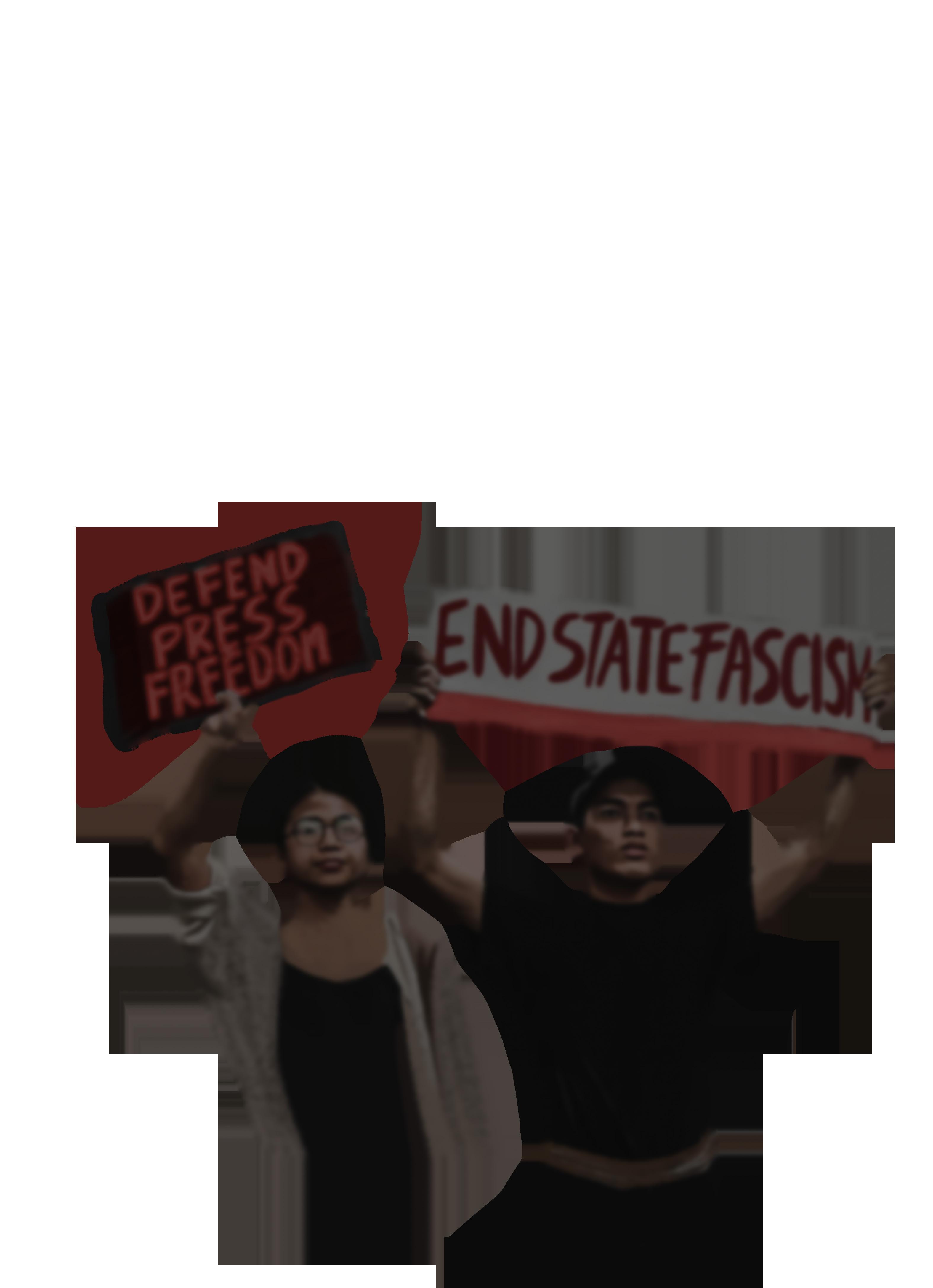
Daughter of Life’s longing for itself

Kara Lenina Taggaoa, Kilusang Mayo Uno’s (KMU) Secretary for International Affairs, is the daughter of Cordillera activist Jennifer Awingan and faculty unionist Ronald Taggaoa. Due to the nature of her parents’ work, Kara and her siblings would stay in Innabuyog Gabriela’s daycare center, along with other children of activists. They were also part of the performing cultural group Children of Cordillera (CHICO), which exposed them to rallies, out-oftown forums, meetings, and discussions about Philippine social realities at a young age.
Kara’s childhood contrasts traditional Filipino parenting, whose core is simply imposing authority and discipline over children, usually through “tough-love” systems of reward and punishment.
Asked if she had ever experienced this feudal parenting style, Kara answered,
“There is no family without existing feudal relations because it is a systemic problem… So there is no such thing as a perfect family—even those with activist parents.”
Despite the influence of such parenting within her family, she shared that they also had opportunities for mutual criticism, selfcriticism, and change. These manifestations of equality and partnership, derived from activist collectives, are traditionally absent in other Filipino families—mirroring centuries of political and economic subjugation. Colonial regimes may have left our shores, but their legacies— proactively adopted by the local ruling class—remain alive in the authoritarian and commercial nature of the contemporary Filipino family. For they have their own thoughts
From the perspective of young activists, Kara’s family dynamics are desirable. She affirmed that although it is easier to have activist parents, it is not something one should be jealous of because “being
ALLEN JOHN DELA CRUZa parent is something that is learned.”
She advised young activists to turn manifestations of backward customs into “points of criticism,” and initiate proper and persuasive discussions using “gut issues.”
She also suggested they “break the cycle” of feudal parenting by unlearning it early and practicing scientific alternatives.
However, from the perspective of those who do not understand activism, Kara’s family is a societal nuisance. Online detractors claimed her parents recruited her into activism, blaming them for her October 2022 arrest over an alleged robbery and assault incident during a July 2020 Anti-Terrorism Law mobilization.
“I have my own experiences of radicalization. My parents being activists are just additional conditions but in my own right, by my own education and exploration, I chose to be an activist,” she asserted.
Unfortunately, misguided views on activism, specifically those held by the family, can translate to extremes. Such was the case of Anakbayan National Secretary General Alicia Lucena who was physically and emotionally abused by her mother, Hands Off Our Children and League of Filipino Parents member Relissa, due to her militant affiliations. But hope lies in the
dynamic nature of the family— its entrenched feudal features can be changed by tirelessly creating the necessary conditions.
For life goes not backward

Online black propaganda against the Taggaoa family is just one of the many forms of harassment they have experienced through the years. Although shielded by childhood innocence, Kara knew her parents “were under threat” from the counter-insurgency campaigns of the Macapagal administration. Her father also endured intimidation under the Aquino administration when he contested the constitutionality of the K-12 system.
According to Kara, attempts to silence her family worsened since the Duterte administration. In addition to her October 2022 arraignment, her mother was arrested over charges of rebellion and insurrection last January 2023. In a press conference about the Northern Luzon 7, the string of activist arrests Jennifer was part of, Ronald shared that his wife was already under intense surveillance before the crackdown.

Incessant harassment brought Kara “constant fear” since childhood—fear they continue to overcome as a family through their tireless assertion of the righteousness
of activism. To remain silent amid injustice is not an option for them.
“Lenin said that despair is typical of those who do not see any way out. For us, it is activism that shows us the way out and brings us hope…” Kara elaborated.



No longer should the family be a source of contradiction in being an activist, no longer the force that drives one to drop the placards and the beliefs they carry. Instead, as the smallest unit of society, it should be a seedbed of changes that will rewrite the tales of filial ownership into those of emancipation.
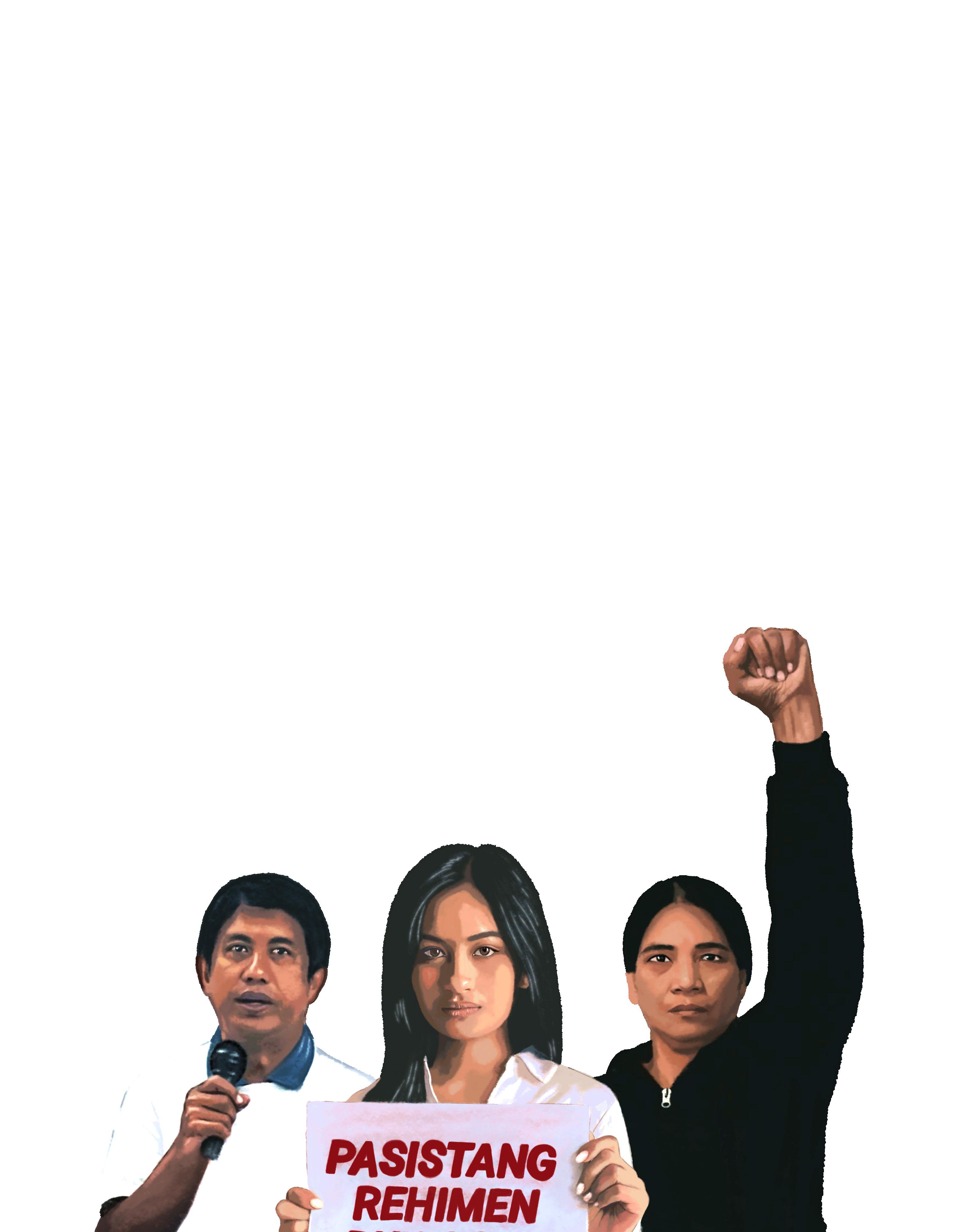
In times of fascism—of fear and demoralization— the family has duties to be a perennial source of refuge, and to be the material reminder of the ultimate question, “If not us, then who?”

Only through the fulfillment of these duties can children freely answer the call of the said ultimatum.
That is, to be children not of their parents, but of the wider and restless society. To be children whose place is not in the confines of their schools and homes, but in the people’s struggles. And to be children conceived by their own theories and practices of the world’s realities— learning not for learning’s sake, but to be equipped for the challenges of making history and changing society. ▼
My younger self knew it was an all or nothing moment when the UPCAT results were
Whether it was through blind confidence, or most likely, laziness, I only applied to two colleges. The other school, although I passed, rejected my scholarship application. I tried to appear confident despite the circumstances, but UP was quite literally my last hope if I ever wanted to go to college.
Luckily, my gamble paid off. Out of the thousands, I was fortunate to be offered a slot in the UP Baguio campus. Although a few hundred miles away from home, I embraced the new venture with the enthusiasm only a naive senior in highschool would hold.
Nowadays, I sometimes think back and wonder if the university I dreamed of is the
same one I go to. In my mind, I always thought of UP as this perfect utopia, but reality is kind to no one—and as it turns out, neither is UP or its admin.
As the days turned into months, this realization eventually crushed my naivety.
That UP only enrolled “the cream of the crop” was besides the point, because even at my best, the very school I sold my soul to always managed to find a way to disappoint, mislead, or burden their very own.
Yet as far back as I could remember, I was convinced that UP would be different.
Ranked the top university of the country with numerous accolades under its belt, I was blinded by the school's reputation that I never paused to think of the reality that goes on behind the scenes. And as I continue my stay here, it appears I wasn’t the only one fooled.
I can clearly recall how an NSTP class’ invited and accredited speaker blatantly red-tagged multiple students
in what was supposed to be a safe space.
Being a freshman, I was not part of this class, but my roommates at the time were, which gave me a chance to witness the entire disaster unfold live. What more if this incident were in a classroom, where students would be told
groups?
Naturally, this created an uproar amongst many. Thus the administration released a statement apologizing for the incident, saying that they would take better steps to ensure this would not happen again.
The admin seemed to follow through, as no similar incident has taken place on campus since; yet months later, another admin-related blunder insured wherein classes had unilaterally been moved to a week earlier. Faculty members and student representatives were not even bothered to be consulted prior to this drastic alteration. Like myself, they were caught off guard and expected to adapt regardless of the circumstances.
However, as posted by the UPB USC in their official Facebook page, the admin claimed that their decision came from “extensive” meetings to discuss the possible amendments to the calendar. Afterwards, they concluded that there was no need to extend the break any longer.
least everyone here I know is glued with common feelings of frustration, and why each of us try to cope in our own ways. Because when the very individuals that praise you for your flight but clip your wings and still force you to soar, you do what you can to make do.
Now here I am, halfway into the second semester and my disappointment has never been greater. In pursuit of face to face, they have overlooked the many prevalent issues that have existed during online classes, leading to more suffering amongst the institution’s members. Although the campus’ doors have been opened, the admin has yet to tackle the many other urgent concerns in the university.
that the organizations in UPB–some of which they were part of– were alleged terrorist front
Puzzles, I’m told, are a great way to spend leisure time.
They supposedly exercise your brain and get you a good boost of dopamine when you finish them, imbuing you with a sense of accomplishment that makes you want to move on to the next puzzle after. I, however, find this claim subject to debate, as the puzzle we’ve been working on at Outcrop has neither stimulated our intellect nor given us a boost of any emotion, save for frustration.
This is the reality of having to navigate the labyrinthine bureaucracy of the University of the Philippines Baguio (UPB), and it’s anything but a relaxing pastime.
In all fairness, UPB’s admin does entertain questions, and the publication acknowledges the rules that must be followed in all our requests. The problem isn’t so much in the willingness to follow instructions but in the comprehension of how the bureaucracy works.
Much of this can be traced back to the sudden shift to online learning brought about by the pandemic. Before
everyone was forced to endure a remote setup, Outcrop was able to print two of its issues in 2019 with ease. Then-Editorin-chief Adrianne Aniban was even invited to participate in a procurement training seminar so Outcrop could transact smoothly with the offices in UPB.
Four years and three editorial boards later, and Outcrop has yet to print any of its content or receive an invitation for a procurement training seminar.
The last attempt to have the pub’s issues printed was in August when I and current Associate Editor - Internals Belle Mila presented a letter to the Supply and Property Management Office (SPMO) for a purchase request (PR). Much to our shock, the office told us they couldn’t process the letter because we had missed the deadline for PRs, followed by a whole bunch of administrative jargon that they did not bother to explain.
That was also when we found out the pub was not included in the mailing list for reminders and notices about
JETHRO ANDRADAadministrative matters.
Though the situation has been remedied since and our pursuit to access our budget has made some headway, we’ve had to learn everything on our own. Navigating UP Baguio’s bureaucracy is akin to entering a moving maze– one wrong turn or two, and you can end up right back at the beginning.
Outcrop’s managing editor and finance officer know all too well how one mistake in paperwork can delay the filing of requests for days. Even more exasperating is the fact that administrators often point out these mistakes halfway or at the tail-end of the process, prompting us to start from scratch when we are so close to the veritable finish line. Not to mention the time spent doing legwork the first time around could have been spent doing other matters relevant to the running of the publication.
Speed is another matter.
From our experience, one to two weeks can just as easily mean one to two months. In the case of staffers and editorial board members like myself who attended the UP Solidaridad

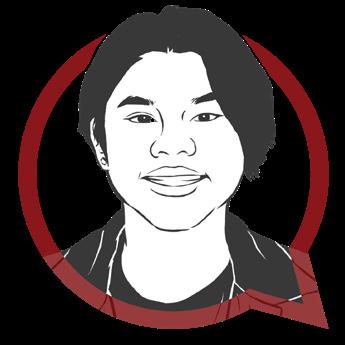
Still, even if incidents like these happen, I try to look for the bright side. Hell, I think that’s the main reason why I’ve made it this far along. At
Congress and General Assembly of Student Councils (GASC) last August, the waiting time for reimbursement took seven months.
Consequently, the sluggish pace of the admin regarding fiscal matters has prompted us to explore other ways to procure funds: solicitation letters, asking our members for “patak,” what have you. Because it’s either that or shell out the cash ourselves.

This article is not to say that the admin is staunchly anti-student or so dysfunctional to the point that it’s impossible for organizations and institutions to get anything done. We defer to the rules and we know that as tedious as they can be, admin processes are put in place for a reason.
But something is clearly amiss, and Outcrop is not alone in harboring these sentiments.
To acknowledge that the pandemic has prevented student formations from learning the nooks and crannies of the university’s bureaucracy is one thing. To take active steps in order to bridge the gap between the student body and those

Despite all that I’ve said, I, along with many others, continue to demand for accountability. We do not find strength in our silence, but with our minds and voice. We continue to make a stand, and we will do so until change is set. Because even though honor and excellence can sometimes be inconsistent in the institution, that does not ring true amongst the students. ▼
running the offices is another.
What is immediate at this point is for the admin to launch procurement training programs tailor-fitted to the needs of the students. Perhaps even a recalibration of the processes themselves are in order, if only to check if the policies are comprehensive to those whose knowledge of the bureaucratic machine is slim to nil.
It would not hurt either to extend leniency when minor lapses in documents and forms are committed; and to provide the studentry a sensible explanation when paperwork errors are so severe as to necessitate a return to square one of the filing process.
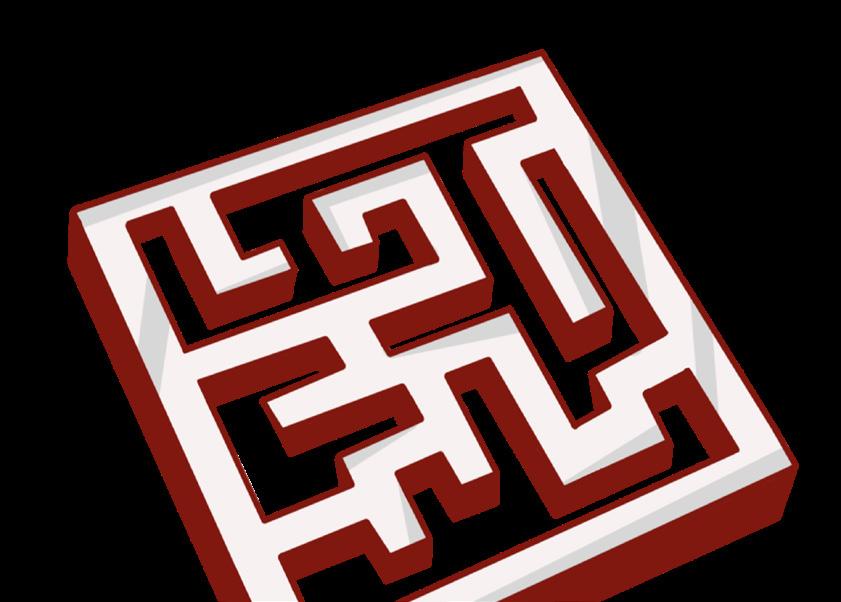
Bureaucracies, after all, were invented to ensure the smooth running of institutions. In no world is that purpose fulfilled when the largest constituency of the university is left jaded and irked by taxing administrative policies and red tape.
A more student-inclusive bureaucracy is definitely in order– one that engages students instead of alienating them.
Anything less and UPB is no different from an unsolvable puzzle: taxing to deal with and every bit as frustrating. ▼



That UP only enrolled “the cream of the crop” was besides the point, because even at my best, the very school I sold my soul to always managed to find a way to disappoint, mislead, or burden their very own.
Mayora, makapapasok ba ako sa paaralan nang walang jeep kung magmumula ako sa Gibraltar papuntang University of the Philippines Baguio (UPB)?
Wright Park hanggang UPB—ilang kilometrong layo lang naman—kayang-kaya lakarin, pero kung aarawarawin kong gagawin ‘to, mas marami pa akong oras na ginugol sa pagpunta sa eskwelahan kaysa sa pag-aaral mismo.
Pwede naman akong magtaxi. Ayun ay kung sa pang-isang araw na allowance ko, katiting lang ang halos isang daang pamasahe. Pwede ring magkotse na lang. Ayun ay kung sinuwerte ako na lumaking may kotse at ‘di na kailangan pang mamroblema sa pagco-commute. ‘Yan ang sana all!
Malaki ang magiging epekto ng pagkawala ng mga tradisyunal na jeep sa ilalim ng Public Utility Vehicle (PUV) Modernization Program, lalo na sa mga estudyante.
Mahirap magcommute ng wala ‘yon, Sara.
Bilang mga umaasa sa
makamasang pampublikong transportasyon upang makapunta sa eskwelahan, kami ang ilan sa napakarami ang makakadama ng negatibong kahihinatnan ng anti-mamamayang programa na Jeepney Phaseout. Iginiit pa ni Kilusang Mayo Uno (KMU) secretary general Jerome Adonis na maaaring umabot ng P35–P40 ang pamasahe sa modern jeep kumpara sa kasalukuyang P12. Mas mataas pa sa doble presyong pamasahe ang maaaring maging epekto ng programa.
Nakabunbon ang mga sektor sa isang strukturang pinagtatagpi-tagpi ang kanilang mga interes, Sara.
Sa gayon noong Marso 6, naglunsad ng week-long strike ang ilang transport groups bilang tugon sa napipintong Jeepney Phaseout. Sinuportahan ito ng higit kumulang na 100,000




na jeepney drivers, operators, transport groups, at iba pang progresibong organisasyon sa iba’t ibang lugar sa Pilipinas, kabilang na ang Alliance of Concerned Teachers (ACT).


Ngunit sa pahayag mo bilang Department of Education (DepEd) Secretary, sabi mo: “Learning recovery is foremost on the agenda of the Department of Education today. It does not include the pointless weeklong transport strike supported by ACT.”

Diniin mo Sara na walang katuturan na ang ACT ay sumuporta sa mga pagwewelga. Bukod pa rito, diiniin mo na taliwas ito sa mga palatuntunan ng DepEd at pawang hadlang lamang sa mga programang kanilang ninanais sa sektor ng edukasyon.
Kaya nga nagrarally at lumalaban sa ‘di makamasang programa dahil apektado ang mga estudyante, mga guro, at mga kawani na gumagamit primarya ng jeep. Lalala lamang ang problema sa edukasyon kung hahayaan na lang nila na mawalan ng pangkabuhayan ang mga jeepney drivers. Sa katunayan, ang mga anak ng jeepney drivers ay mga mag-
May medalya pa bang maiuuwi sa pamantasang walang atletang pagsasabitan?
Nang malaman kong nakapasa ako sa Unibersidad ng Pilipinas (UP), bilang isang atleta, nakita ko na ang sarili kong suot-suot ang jersey, naglalarong nakataas ang noo, at dala-dala ang pangalan ng pamantasan kalakip ang husay at dangal ng isang iskolar ng bayan.

Gayunpaman, sa kabila ng aking matayog na pangarap, taliwas ang nangyari.
Binalot ako ng pagtataka’t kalungkutan nang malaman kong hindi na magsasagawa ng tryouts ang unibersidad. Ayon sa diyalogo sa pagitan ng University Student Council Sports Desk Councilor at Human Kinetics Program (HKP), wala naman daw kasing atleta sa pamantasan, at hindi rin daw nakapaglaan ng badyet para sa mga coaches at trainers.
Nakapagtatakang sa kabila ng aming malakas na presensya at pangangalampag, para kaming hangin na dumadampi
lang sa balat ng administrasyon. Kahit pa may ilang mga alumni at instruktor na boluntaryong nagpaabot ng kagustuhang magturo at magsanay, kibitbalikat lamang ang HKP. Sa kabila ng mga kondisyong nagpapahintulot sa mga atleta na lumago, tila ba nagbubulagbulagan lamang sila. Para bang taingang selektibo sa dinidinig na boses, at nakalulungkot na hindi kami ang kanilang piniling pakinggan.
Isang pangarap na sa isang iglap, naglaho. Hindi naisakatuparan ang aking mga hinihiling–naging malabo na ako’y makapagsuot ng jersey na may pangalan ng unibersidad sa harapan at lumabang nakataas ang noo.
Nakapanlulumo pa ring isiping sa dinami-rami naming mga nagnanais na makapaglaro para sa UP Baguio, nananatiling limitado ang oportunidad, espasyo, at suportang ibinibigay ng pamantasan.

Ang karanasan ko bilang manlalaro ng volleyball ay hindi nalalayo sa danas at
sentimiyentong mayroon ang iba pang varsity teams. Katulad ng volleyball team, hirap ding makahanap ng espasyo ang Debate Varsity at Basketball team upang makapagensayo. Kinakailangan pang dumaan ng Debate Varsity
Nawa’y mapagtanto ng kinatataas na hindi hiwalay ang pang-akademikong pangangailangan ng pamantasan sa hinihiling na suporta ng pampalakasan.
team sa burukratikong proseso makahanap lamang ng alternatibong espasyong pagsasanayan. Hindi rin ito naiiba sa usad-pagong na prosesong dinadaan ng mga manlalaro ng basketball para makagamit ng Himnasyo Amianan.
Bukod sa burukratikong proseso, binigyan pa ng HKP
aaral din naman.
Nakabunbon ang mga sektor sa isang strukturang pinagtatagpi-tagpi ang kanilang mga interes, Sara.
‘Wag mo sanang isawalang bahala ang tuwirang epekto ng magkakaibang sektor sa isa’t isa. Tignan natin ang mga tsuper na mawawalan ng trabaho dahil sa “makataong” P2.7M na jeep niyo. Tapos nanaisin pa ng PUV modernization niyo na sila na nga ang mawawalan ng prangkisa, sila pa muling magtutubos ng pondo para makabili ng Euro 4 Diesel Engine na jeep.

Hindi ba bilang halal na Bise Presidente na humingi ng boto mula sa mga tsuper at masang api ay mabigyang importansya mo man lang sila?
Paalala lang na hindi sila parte ng tatsulok niyo, hindi sila naghaharing-uri gaya mo.
Karapatang pantao ang pagtutol sa ‘di makatarungang polisiya. Nakaangkla sa ating karapatang pantao na hingin ang karapat-dapat na atin. Ito ay pinagtibay ng ating Konstitusyon, at patuloy itong
ng kondisyon ang Alyansa ng Nagkakaisang Kabataan sa Unibersidad ng Pilipinas (ANAK UP) na dapat agaran nilang mapinturahan ang Court A upang makapaglunsad ng tryouts. Animo’y kailangan pang trabahuhin ng mga manlalaro ang oportunidad na dapat ay inilalatag na lamang sa kanila.
Kahit na sa higit tatlong taon makalipas nang maganap ang pag-uusap sa pagitan ng admin at mga atleta noong 2020, hindi pa rin naisaayos ang aming lagay; sa halip, lalo lamang lumala. Ang gintong hinahangad naming mga atleta ay hindi na lamang binabalot ng kalawang, bagkus untiunti na ring rumurupok at nadudurog.
Ang gintong medalyang hinahangad ko noon ay para bang nawalan ng kinang at hindi na muling maisasalba. Patunay ang lagay at danas ng mga mag-aaral-atleta na wala sa indibidwal na kakayahan ang problema, bagkus nasa sistemang mayroon ang UPB.
Malinaw sa mga
karanasang ito na iisa lang ang nais ng bawat
ginagamit upang malabanan ang mga mapang-abuso, mapagsamantala, at mapangahas na kalaban ng mga mamamayan.
Isang makamasang sistemang pantransportasyon ang nais mapatupad ng mga estudyante; isang sistemang pantransportasyon na kinikilala ang lahat ng kaakibat nito.
Sinasalo ng lipunan ang isa’t isa, Sara.
Hayaan ninyo kaming magkaroon ng boses at makipag-diyalogo sa inyong nakatataas dahil damay-damay tayo dito. Nadama ng ACT at ng sangkaestudyantehan na ang krisis ay nakalulugmok kung kaya’t buong sambayanan na ang sumasama.
Kahit na anong gawin naming unyon, kahit na anong programang inyong maisakatuparan, at kahit na anong batas ang ipataw niyo, kung ang hinaing ay hindi niyo didinggin at ang suliranin ay inyong pababayaan, iyon ang tunay na pointless—pointless na administrasyon! ▼
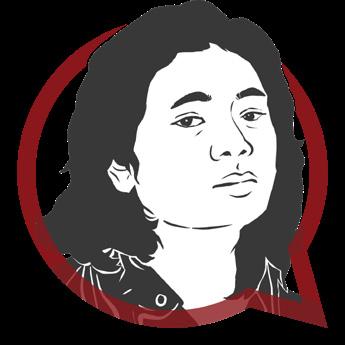
atleta sa UPB: ang mabigyan kami ng pansin at suporta ng pamantasan. Sa kabila ng pagkakaila ng administrasyon ay patuloy pa rin kaming tumitindig bilang mga manlalaro para sa demokratikong karapatang marapat na ipagkaloob sa amin. Hindi ang pagkakait sa paggamit ng Himnasyo Amianan ang makapipigil sa puso ng mga atletang nag-aalab. Hindi kawalan ng suporta sa uniporme at pagkain ang makapagbubusal sa amin upang mangalampag at humiling ng pananagutan mula sa administrasyon.
Nawa’y mapagtanto ng kinatataas na hindi hiwalay ang pang-akademikong pangangailangan ng pamantasan sa hinihiling na suporta ng pampalakasan Hindi dapat mapako ang mga pangako sa mga magaaral-atleta. Sapagkat ilusyon ang makapag-uwi ng gintong medalya para sa pamantasan kung patuloy lamang mababalewala ang aming mga sigaw at panawagan. ▼
Taught by the Marcos Faculty of Thievery and Fraud, sharpen your skill in deception through various forms of art.
Imagine a class painting a coherent picture on a single canvas wherein each individual carries a different colored paint and a brush. Instead of helping create a harmony of colors, some would try to make their mark through techniques like pouring hints of selfglorification, splattering with some absurd myths, and mellowing it down with a bit of deception. The result is a piece demeaning the intended work and the practice of art itself, leaving others to accept the horrors of what is in front of them. From this point, we can compare these saboteurs to the Marcoses in their quest to tarnish the nation's progress.
Today, we can see that these scoundrels no longer try to deform the vision of a prosperous nation; but instead, create a dirt pile covering their blood-stained tracks. The Marcos family—a constant portrayal of lies whether painted on a canvas or filmed—has disrupted democracy throughout history to quench their insatiable greed, using any means necessary, including art.

During the tyrannical couple’s stay at Malacañang, they constructed an image depicting themselves as “Malakas” and “Maganda.”
Malakas and Maganda are mythological characters from Philippine folklore said to be the ancestors of all Filipinos—a counterpart to the bible’s Adam and Eve. Malakas embodies strength, while Maganda symbolizes beauty and purity. The first couple commissioned various paintings and sculptures— most notably to the late Evan Cosayo—presenting Marcos Sr. as powerful and muscular as Malakas and Imelda as charming and elegant as Maganda.
Such works were all part of Marcos Sr.’s plan to make the Filipino people view them as the country’s mother and father, a ploy using the subject of family in crafting his image of a “new society.”
Decades later, as the country finds itself in another Marcos administration, the controversial Darryl yap movie of "Maid in Malacañang"
attempts to legitimize the Marcoses' tall tales. It showed the apparent final days of the Marcoses in the Malacañang Palace during the fall of the Marcos regime.
With Imee Marcos as executive producer, the film was predictably laden with scenes soliciting pity for the Marcoses, especially the "tear-jerking" moment wherein Malacañang was supposedly close to running out of food. Furthermore, the film put Ferdinand Marcos Sr.’s dictatorship in a good light, changing the narrative into the people taking the late dictator’s efforts for granted.
Imee, played by Cristine Reyes—went ballistic in a scene where she repeatedly cursed out her father's "traitors" and blamed Marcos Sr. for being too "nice," leading to their downfall. To cap off the film, a purposefully-made heartfelt scene saw Imee boldly state, “Hindi nila mabubura ang katotohanan, na ikaw ang pinakamahusay na pangulo ng Pilipinas.”
These false dialogues within the film contributed to the belief in a “golden age” during Marcos Sr.’s time, fooling supporters and the uninformed alike. It creates a false image of legitimacy while whitewashing the regime's corruption and human rights violations. Such could also lead to forming a follower mentality likened to a disease that the Marcoses refuse to be treated. These uses and effects misrepresent the essence of art's potential and contributions to society.
Early in life, we know art as mere drawings of what we want to show on paper, bringing it to life with Crayolas bought from the market. Barring such juvenile concepts, it is more of a multifaceted mirror that shows the social, cultural, and political realities that an individual experiences.
The Marcoses and their allies have strategically weaponized art to consolidate their power and influence in the Philippines, employing subtle yet insidious tactics to manipulate public perception and rewrite a history that favors them. Furthermore, they have relentlessly pumped out artistic propaganda legitimizing their authoritarian regime in the past and making a case to validate instituting it in the present.
Throughout history, art has not only served selfish benefactors but has also been a powerful tool for opening minds and sparking debates in the pursuit of change.
An example is Lina Brocka's Maynila sa mga Kuko ng Liwanag; a film challenging the Marcos government's narrative of progress and modernization by portraying harsh poverty and oppression in Manila. It gave voice to the frustrations of marginalized Filipinos excluded from the benefits of economic growth. To quell potential unrest, the film was banned while Brocka was harassed and detained.
Thus, art is not just a depiction of an image in one’s mind; it is the reality faced by society and the need to illustrate it in a manner that fully encapsulates the struggles they experience.
Moreover, like in the case of Brocka, the attacks against artists and works that expose and challenge the status quo prove how art has the power to provoke, challenge, and
CARL JOSHUA CALMAinspire, even in the face of repression and censorship.
As



Like the Marcoses’ strategy of spreading fake news online, various artworks made to favor them bend the truth to either expand their following or strengthen the false beliefs of loyalists. Through these acts, the nation and its people fall victim to the rotten culture of the arts designed by those in power–a system rigged to further their interests, never mind the lives of those they would stomp on.
Although the administration weaponizes art, the masses must use it as a medium to educate and surface truth. In the face of government propaganda, artists can create counternarratives that challenge the dominant discourse and expose the harsh reality hidden by the oppressors. Thus, deferring from fear and the idea that art is powerless is essential, for it has the potential to break through the stained culture of the nation.
In the words of Lino Brocka, “They may gag and blindfold you, silence and imprison you, but they will never be able to destroy what made you an artist in the first place–your brave and continuing dedication to the human race.” Consequently, artists must develop works that inspires and empowers the masses to take action toward a more just and equitable society; for art, however beautiful, is devoid of meaning if done only for its own sake.
When art empowers and mobilizes, we can capture what this course wishes to teach you about what art means to accomplish: to comfort the disturbed and disturb the comfortable. Class dismissed. ▼
The Perilous Course of Inspiration into Indoctrination